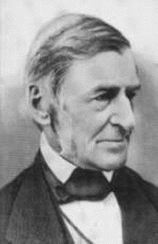May 25: Ralph Waldo Emerson
Ralph Waldo Emerson (1803)
It was on this date in 1803, that American poet, essayist and moralist philosopher Ralph Waldo Emerson was born in Boston, Massachusetts, the son of a Unitarian minister. After graduating Harvard in 1821, and teaching for a few years, Emerson was ordained into the Unitarian ministry. Six years later he resigned over doctrinal differences to form the group coming to be known as Transcendentalists, a company of writers and thinkers expressing an ethical idealism.
Emerson made a living as a popular lecturer in New England and much of the rest of the country. He gave more than 1,500 public lectures across the United States. Staunchly anti-slavery during the pre-Civil War years, when such a position was not respectable, Emerson gave a public lecture at the Smithsonian on 31 January 1862, declaring, “The South calls slavery an institution... I call it destitution... Emancipation is the demand of civilization.”
His 1841 essay “Self-Reliance,” which counseled avoidance of social conformity and earned favorable reviews in London and Paris, was called by a relative a “strange medley of atheism and false independence.” In it can be found one of Emerson's most famous quotes, “A foolish consistency is the hobgoblin of little minds.”
Of Emerson’s literary achievements, much has been written in praise, as well as of his character and his steadfast moral opposition to slavery. Though considered the leader of the movement, Emerson never called himself a Transcendentalist, and had no idea to form a religious sect. Indeed, he was far more tentative in his moral ideas than any religion must be. He repudiated even the amorphous Unitarian God and believed instead in a vaguely Pantheistic Over-Soul. Emerson also rejected the idea of personal immortality. The influence of the “Concord Sage” was profound on such writers as Walt Whitman and Henry David Thoreau. The leading voice of intellectual culture in the United States of his time, Ralph Waldo Emerson died on 27 April 1882, age 78, and was buried in Sleepy Hollow Cemetery, Concord, Massachusetts.
Originally published May 2003 by Ronald Bruce Meyer.


